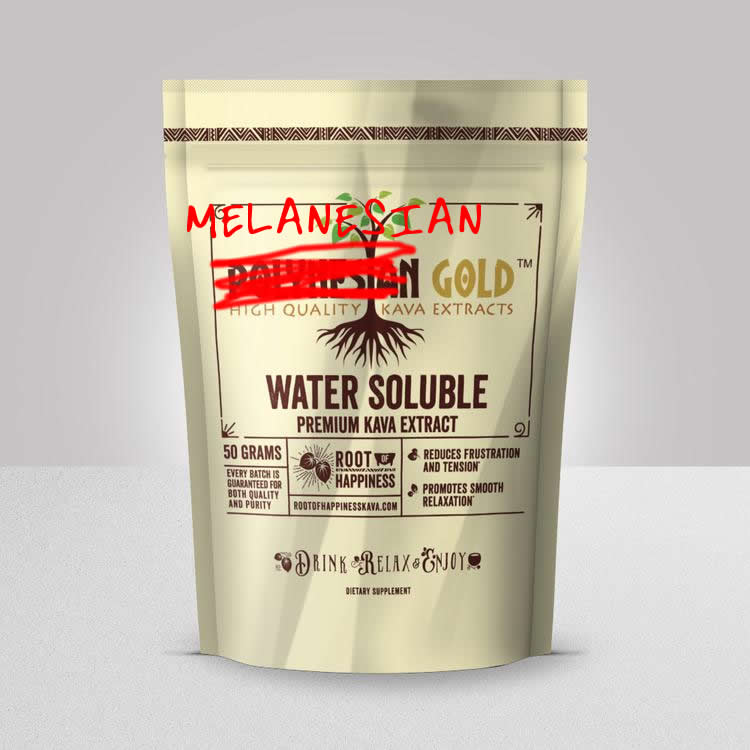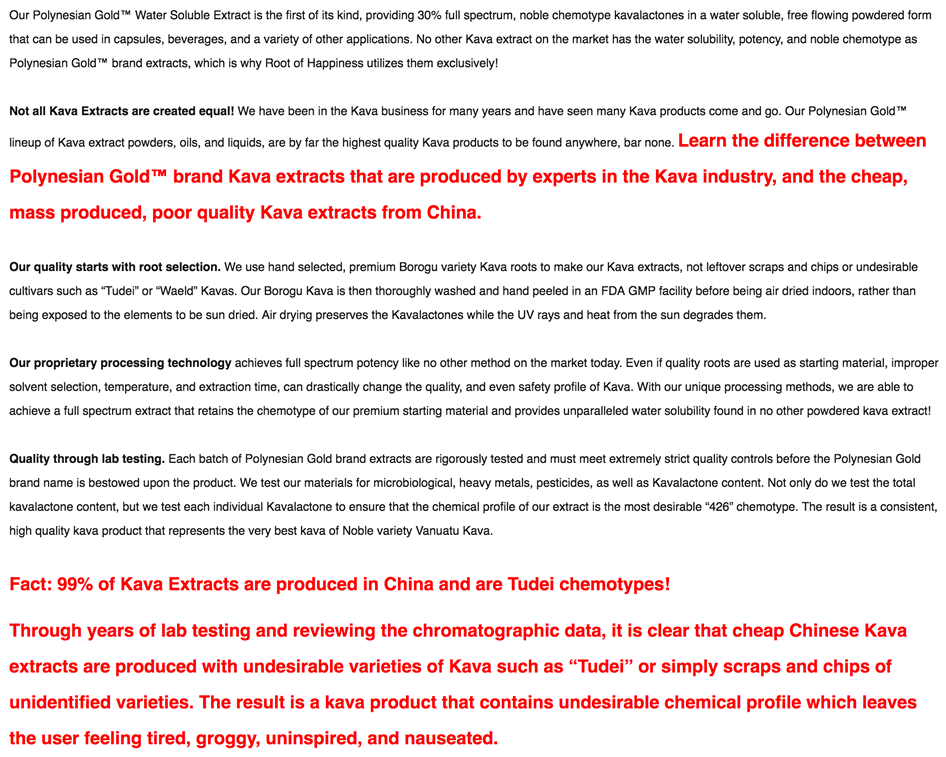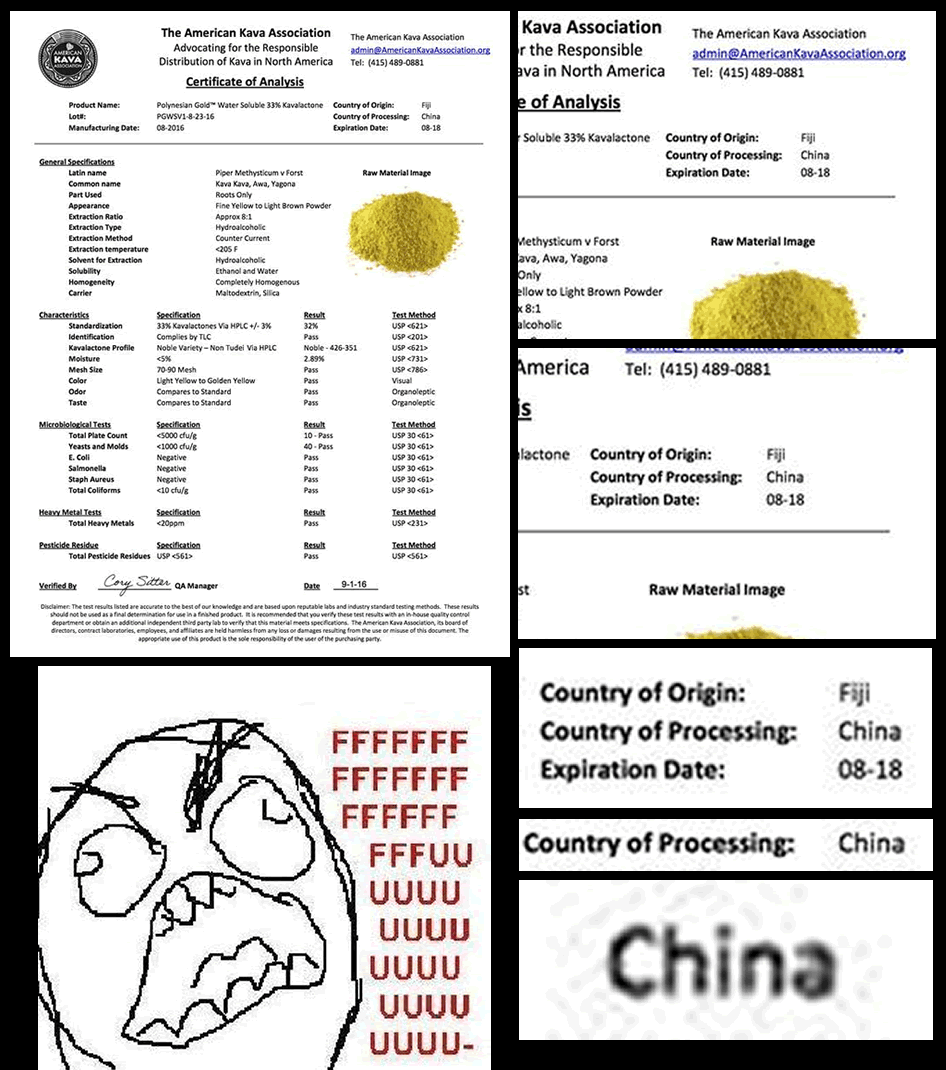Like I said, first hand answers will be coming shortly.
Interrogatory and Vendor Updates - Root of Happiness 30% Kava Extract
- Thread starter kasa_balavu
- Start date
- Status
- Not open for further replies.
verticity
I'm interested in things
The COA actually says the extraction method is hydroalcoholic, in other words, using a mixture of water and alcohol. The extraction method is "Counter Current". This is a separation method that involves some kind of big machine that kind of jostles the powder around in the solvent.The way that the powder extracts like this are made is by using a carrier like dextrose, they measure the kavalactones of the concentrated extract mostly a CO2 extract and then they will calculate how much carrier to add to get to the 30% kavalactones or what ever they are trying to get. Aloha.
Chris
When I try to find information on counter current kava extraction, this comes up: a Chinese company selling a very similar sounding extract:
http://www.extract-factory.com/natural-kava-extract-kava-lactones-30-powder-28837
verticity
I'm interested in things
It is a pretty extreme example, I will admit. I did not in any way mean to imply that Polynesians are like Nazis, or that anyone thinks they are. It was just to point out that when a foreign culture appropriates a name from another culture, there is always the possibility that the people in the culture it is appropriated from might be offended if it is used in a way that seems insensitive or inappropriate to them.I think comparing calling something Polynesian to a Nazi theme is a bit of a jump. Honestly, I doubt the islanders would care much. They're not nearly as touchy as us westerners are. I'm in Polynesia now. I'll be hanging out with some kava farmers tomorrow and I'll ask if they would be offended by calling a drink made from Samoan kava "Melanesian Gold".
verticity
I'm interested in things
Well, we have already heard a couple first hand answers from Melanesians here.Like I said, first hand answers will be coming shortly.
verticity
I'm interested in things
I will admit though, that before I joined this forum and started learning about kava, I had never heard of Melanesia. My mental map was: there was Australia and New Zealand, and a bunch if islands called Polynesia. (Oh, and I didn't know Hawaii was part of Polynesia) And there was also something called "Micronesia". I wasn't clear on the difference between Micronesia and Polynesia. Actually, I am still not clear on that. So I can see how someone living in Melanesia could easily be exasperated at the ignorance of people like me who didn't even know that the place they live in has a name, much less what the name was.
Well you'll soon have a handful of first hand answers from people who have no idea which company is behind the product in question.
verticity
I'm interested in things
Does the fact that you are hanging out with kava farmers in Samoa mean that you will be selling Samoan kava? That would be nice.I think comparing calling something Polynesian to a Nazi theme is a bit of a jump. Honestly, I doubt the islanders would care much. They're not nearly as touchy as us westerners are. I'm in Polynesia now. I'll be hanging out with some kava farmers tomorrow and I'll ask if they would be offended by calling a drink made from Samoan kava "Melanesian Gold".
It looks that way. I just want to see the farms myself, but all sounds good. There is someone who is ready to do the exporting, meaning they have the registrations and knowledge necessary, and that is sometimes hard to find. If all goes smoothly, we could have a Samoan kava in under a month.Does the fact that you are hanging out with kava farmers in Samoa mean that you will be selling Samoan kava? That would be nice.
verticity
I'm interested in things
It's an alcohol extract, not a CO2 extract. China does have it's own GMP. Theoretically, Chinese production plants that export to the US could comply with FDA GMP. I'm not sure if that is the case here, or if complying with the Chinese GMP is considered good enough to also comply with the FDA GMP.
You can't accurately determine the nobility of the source material used to make extracts, because the extracts can be manipulated chemically to make them appear noble.
You can't accurately determine the nobility of the source material used to make extracts, because the extracts can be manipulated chemically to make them appear noble.
Last edited by a moderator:
D
Deleted User01
Nice one Headgie!It took me awhile to figure out what you were talking about (I'm slow in my old age). But I finally did.
Well fuck... I just ordered some this morning just to check it out. So do you believe there is a real problem with this product, or are you just pointing out the irony of the hype vs the COA? I don't really know if the product name is a big deal or not. I guess they could have called it Beijing Gold and I might still have bought it, if it's a reputable dealer.
Just kidding .... Hey, I'll bet Chinese Food potentiates that particular extract.
To be clear and forthcoming, I added his products to the folder. I have nor had any reason to think anything negative of his products. I have been in touch with him, he did not ask me to add anything, this is something I took upon myself as I do for any other vendors on this website.
The difference is that I'm upfront about itThe Cactus Kava approach of giving kavas from certain South Pacific nations random names based on words from other South Pacific nations is better, though.
I'm 99% positive I know who his wholesaler is for this. I'll post a CoA when I'm at a desktop to show the similarities.So it was a balmy Fijian morning and I was looking through "New Posts" (as you do), and happened across a post by Root of Happiness describing their 30% Kava Extract.
A quick aside before we get to the reason for the product alert:
They falsely advertise this as a Polynesian product despite it being of Melanesian origin. Cultural ignorance, or deliberate attempt to mislead? Who knows, but assuming the later, Melanesians would find this offensive. The terms Melanesian and Polynesian carry connotations that one would be a fool to ignore. If one considers kava produced by Polynesians to be more marketable to your demographic, then source your kava from Tonga, Samoa, or Hawaii.
That said, this might just be ignorance. The vendor has another product they claim to grow in their own farm in "Western" Samoa. The nation dropped that name two decades ago.

Anyway, let's get to why you should avoid this product:
First, let's read the product description. Their own words. I've highlighted the pertinent points for you.

There you have it. Something I'm sure we all agree with here on KavaForums.
Cool, now let's take a look at the COA they publish on the very same page.

edit: On second thought, I'll let RoH speak for themselves.
Last edited:
Look, despite ROH being a competitor, I want to come out and say that from all I know they're doing things right and have good products. I know the sources of much of their kava and it's all really good material. They're also testing more products more consistently than anyone I know. They test for KL, FK, microbiological, and heavy metals. It's extensive. I'm nearly certain they don't currently sell any tudei or mixes, and their instant is top notch.
As for this CoA, there are clearly inconsistencies. Maybe they uploaded the wrong file, maybe they changed the source material from Borogu to a Fijian kava and forgot to update. I really don't know. Funny thing is, they were trying to be upfront and helpful by doing something that no other vendors do, and now they're taking heat maybe just because a single CoA has a typo. I can say that if they're saying it's noble that would likely be because the source material was tested before it was processed.
People ask why ROH wouldn't be more active here. This is why. Someone notices an inconsistency and instead of sending a friendly question in a PM or something members post loud shouting graphics with FFFFUUUU all over them, practically guaranteeing you won't have it cleared up.
I know there are some passionate members here, but give the guy a chance before busting out the pitchforks. No need to be so accusatory .
As for this CoA, there are clearly inconsistencies. Maybe they uploaded the wrong file, maybe they changed the source material from Borogu to a Fijian kava and forgot to update. I really don't know. Funny thing is, they were trying to be upfront and helpful by doing something that no other vendors do, and now they're taking heat maybe just because a single CoA has a typo. I can say that if they're saying it's noble that would likely be because the source material was tested before it was processed.
People ask why ROH wouldn't be more active here. This is why. Someone notices an inconsistency and instead of sending a friendly question in a PM or something members post loud shouting graphics with FFFFUUUU all over them, practically guaranteeing you won't have it cleared up.
I know there are some passionate members here, but give the guy a chance before busting out the pitchforks. No need to be so accusatory .
Tyler
Kava Vendor
Oh the Kava Forums. Where to even begin? Nazis? Cultural insensitivity? CHINA? I will try to break this down in terms that everyone can understand and leave no room for misinterpretation, or room for Nazi associations etc..
As I understand it, someone has taken just about everything that they possibly could about this product out of context and issued a product alert for the purpose of smearing our company... based upon the geographical location of our contract lab for this batch of material, and not liking the brand name of the product. Is there a quality control issue with this product? Did it test any different than what we've stated? If not, I'm not sure that a knee-jerk reaction product alert is warranted.
- Polynesian Gold™ is a trademarked brand of Kava extracts that was started in 2012. This is a trade name for specialty extracts that utilize our proprietary processing methods to attain desirable characteristics, such as water solubility, or preferential chemotype profiles. Period. The Polynesian Gold™ brand encompasses all types of different kava extracts (water, CO2, Hydroalcoholic etc.) from all types of different Kavas from all over the South Pacific, Melanesian and Polynesian islands alike. This is no different than "Americas Tire Company" selling car tires that are produced in Japan. I'm sure you can find any number of thousands of similar examples of names of companies vs. raw material / manufacturing origins, if you weren't simply looking to smear our company.
- Polynesian Gold™ is manufactured by Root of Happiness, an American Company. We are the manufacturer of this product. In our write up, we are stating the simple truth that 99% of all cheaply made, mass produced Chinese Kava Extracts, like those that you would find on Alibaba or TradeKey, are garbage and potentially hazardous. Is this really news to anyone here? We are pointing this out to the public because we have run literally hundreds of analytical tests on these sorts of products looking for a cheaper way to produce them, not so that someone can take it out of context and smear our company.
- We contract various FDA GMP facilities to process our materials, using OUR methods and OUR raw materials so the we have control over the process. Some are in China, some are in India, others are right here in the good old USA. In FDA terms, since it is our raw material, our extraction technique, our spec sheets, our analytical testing afterwards, and us packaging the products, this makes us the MANUFACTURER of the product. That makes our contract lab.... the processor of our raw material. We specifically point out the difference between cheaply made mass produced, ready to buy extracts from China, and our brand of products the we custom manufacture.
As I understand it, someone has taken just about everything that they possibly could about this product out of context and issued a product alert for the purpose of smearing our company... based upon the geographical location of our contract lab for this batch of material, and not liking the brand name of the product. Is there a quality control issue with this product? Did it test any different than what we've stated? If not, I'm not sure that a knee-jerk reaction product alert is warranted.
Tyler
Kava Vendor
There are no processing facilities in Van, Fiji, or anywhere in the South Pacific that are capable of carrying out our extraction teks, and the amount of material needed to produce a batch f extract is enormous. It makes financial sense to ship directly from the islands to a processing lab, rather than to us, and then to the lab.Well, if it's an alcohol extract then I am really perplexed how it can make financial sense to ship kava across the ocean to get it extracted in China. I am not saying it doesn't, perhaps the labour costs etc are lower. I am just surprised.
Hello @Tyler
Thank you for your replies. Ok, so this extract is produced in China in accordance with your instructions from the raw material that you arrange/source from the islands. Obviously you don't have to answer this question (or any other question), but out of curiosity: is it really so much cheaper to get it done in Asia rather than in America? I think many customers are a bit concerned about the integrity of the Chinese manufacturers/contractors in light of all the scandals with their extracts and other food products. Don't get me wrong, I am not saying there is any issue with your extract. All I am saying is that China has a rather terrible reputation when it comes to food safety and kava. I know you are aware of this. So in this context, wouldn't it make more sense to do it in America? Just from the POV of PR/reputation? Perhaps it's just too expensive, I don't know. All I am saying is that different places have different reputation. E.g. cheese or watches from Switzerland will appear as more trustworthy and reliable than cheeses and watches from North Korea, China or Burundi. But maybe it's just my personal bias..
I
Thank you for your replies. Ok, so this extract is produced in China in accordance with your instructions from the raw material that you arrange/source from the islands. Obviously you don't have to answer this question (or any other question), but out of curiosity: is it really so much cheaper to get it done in Asia rather than in America? I think many customers are a bit concerned about the integrity of the Chinese manufacturers/contractors in light of all the scandals with their extracts and other food products. Don't get me wrong, I am not saying there is any issue with your extract. All I am saying is that China has a rather terrible reputation when it comes to food safety and kava. I know you are aware of this. So in this context, wouldn't it make more sense to do it in America? Just from the POV of PR/reputation? Perhaps it's just too expensive, I don't know. All I am saying is that different places have different reputation. E.g. cheese or watches from Switzerland will appear as more trustworthy and reliable than cheeses and watches from North Korea, China or Burundi. But maybe it's just my personal bias..
I
Last edited by a moderator:
Tyler
Kava Vendor
Hey Henry. America has a rather terrible Food Safety track record. Germany was the source of the Kava extract that caused the ban 20 years ago.. No place is a safety guarantee. I use the contract labs that I use because they have international standards such as ISO 9001, are certified by NSF GMP auditors, and have American FDA facilities and warehousing. This is also precisely why our material is tested before it gets extracted, after it is produced, and after it is received here. I know of no other product offered here that undergoes three sets of tests before being offered to the consumer.
AKA is another topic for another thread.
AKA is another topic for another thread.
- Status
- Not open for further replies.
